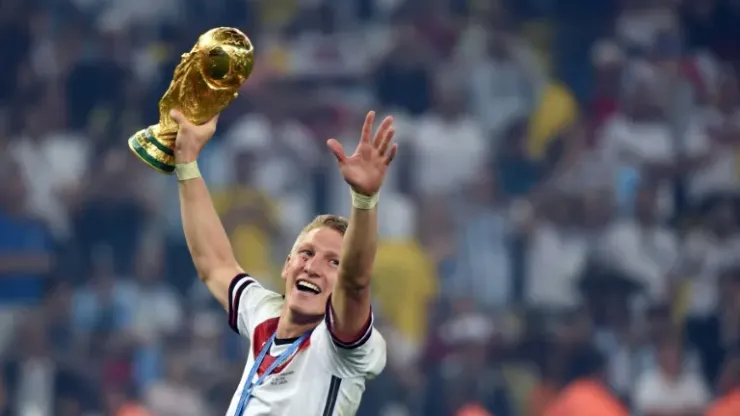Berlin (AFP) – Germany’s midfield general Bastian Schweinsteiger walks away from international football two years after his crowning moment at the 2014 World Cup in Brazil.
Bloodied but unbowed, Schweinsteiger was magnificent at Rio de Janeiro’s Maracana stadium in the final, ensuring Germany controlled the midfield before Mario Goetze’s extra-time winning goal against Argentina.
After 12 years and 24 goals in 120 international appearances, “Schweini” leaves a proud legacy, with Germany having reached at least the semi-final stage of the past six major tournaments.
The past two injury-hit years have been unkind to the 31-year-old, who opted to quit Bayern Munich, the club he joined as a teenager in 1998, for a high-profile switch to Manchester United in 2015.
A knee injury in January was aggravated while on Germany duty in March, meaning he was restricted to a handful of games before coming off the bench in “die Mannschaft’s” opening Euro 2016 group game to score with his third touch of the ball in a 2-0 win over Ukraine.
The March injury to the medial ligament in his right knee meant he played in only five of Germany’s six Euro 2016 games — sitting out the goalless draw against Poland — and started just the semi-final defeat to France.
On his return to Old Trafford, after marrying tennis star Ana Ivanovic, new Manchester United boss Jose Mourinho has reportedly told the Germany star he is free to find a new club with two years left on his contract.
With his club future open, now is the right time for Schweinsteiger to quit international football, with Germany set to play their opening 2018 World Cup qualifier in September.
– Teenage debut –
He made his senior international debut as a 19-year-old in 2004.
Plucked from the Under-21 team, he played at Euro 2004 where Germany crashed out in the group phases — the only time Schweinsteiger went home before the knockout stage of either a World Cup or European Championship.
Schweinsteiger scored the first of his 24 goals in a friendly win over Russia in 2005 and by the age of 22 he had already made more than 40 appearances for Germany.
He cemented his defensive midfield place as the hosts finished third at the 2006 World Cup.
His red card in the group stages of Euro 2008 saw him serve his suspension watching the next game alongside German Chancellor Angela Merkel, who ticked him off for being sent off for reacting to a challenge in the shock 2-1 defeat to Croatia.
Germany reached the Euro 2008 final with Schweinsteiger scoring a superb goal in their 3-2 quarter-final win over Portugal.
By the 2010 World Cup, Schweinsteiger was in charge of Germany’s midfield, with Michael Ballack ruled out by injury.
With Philipp Lahm captaining at right-back, Schweinsteiger led in the middle.
But questions were asked about his leadership skills when Germany exited the semi-finals of Euro 2012 after a 2-1 defeat to Italy.
The Champions League title followed in 2013 as his Bayern team became the first German club to win the treble of European Cup, Bundesliga and German Cup titles under Jupp Heynckes.
Victory in the Wembley Champions League final was followed by the Club World Cup and UEFA Super Cup trophies in the second half of 2013 during Pep Guardiola’s first year in charge.
Schweinsteiger silenced his critics with a commanding display in Brazil — the 2014 World Cup was his finest hour for Germany.
An ankle injury saw him sit out the opening 4-0 drubbing of Portugal but he featured in the 2-2 draw with Ghana and 1-0 win over the USA.
He put in solid displays in the last-16 and quarter-final wins and came into his own in the 7-1 rout of hosts Brazil in the semi-final as the Selecao’s defence shipped five goals in the opening 30 minutes.
But it was the final where Schweinsteiger really shone, standing up to repeated poundings, to keep Argentina at bay.
200+ Channels With Sports & News
- Starting price: $33/mo. for fubo Latino Package
- Watch Premier League, Women’s World Cup, Euro 2024 & Gold Cup
The New Home of MLS
- Price: $14.99/mo. for MLS Season Pass
- Watch every MLS game including playoffs & Leagues Cup
Many Sports & ESPN Originals
- Price: $10.99/mo. (or get ESPN+, Hulu & Disney+ for $14.99/mo.)
- Features Bundesliga, LaLiga, Championship, & FA Cup
2,000+ soccer games per year
- Price: $5.99/mo
- Features Champions League, Serie A, Europa League & Brasileirāo
175 Premier League Games & PL TV
- Starting price: $5.99/mo. for Peacock Premium
- Watch 175 exclusive EPL games per season






